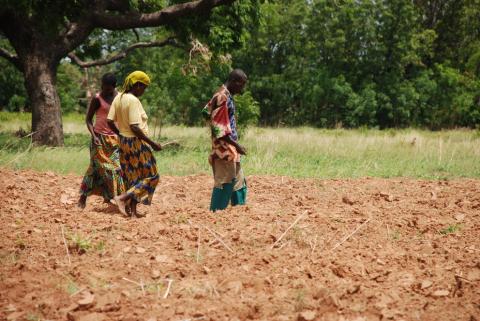
A $450,000 grant from the U.S. Agency for International Development’s Feed the Future Innovation Lab for Peanut Research will aid researchers in Penn State’s College of Agricultural Sciences as they explore the potential to empower women farmers in northern Ghana through peanut production.
“In rural Ghana, where most rely on farming for survival, families often live in extreme poverty and face many challenges, including a scarcity of running water and electricity,” said Leland Glenna, professor of rural sociology and science, technology, and society, who is among those spearheading the project.
He said women carry an unusually heavy workload because they are responsible not just for child-rearing and household tasks, but also for fieldwork and other farm chores. Yet, though women’s contributions may equal or exceed those of the male head-of-household, most women tend to have little say in household decision-making, he noted.
The team suggests that one way to improve the lives of these women is to introduce accessible technologies, along with an educational intervention designed to facilitate women’s empowerment. The goal is to enhance peanut production and processing practices, which may help to improve their families’ diets and provide them with extra income.
“Peanuts are not only a sustainable and nutritious crop, but they can be highly profitable in regional markets and beyond,” said Glenna, whose previous work in Ghana focused on the nutritional and economic benefits of sweet potatoes. “By giving women the skills and tools to grow and market their crops, we aim to improve their opportunities and their self-confidence.”
Glenna said that while peanuts are widely grown in Ghana — with women serving as the primary producers and processors — most families have not realized much success with the crop, mostly due to a lack of improved seeds and limited technology.
But the most significant hurdle is that peanut production requires a lot of labor, Glenna explained. “Since women have to work in men’s fields first, and with peanuts regarded as a women’s crop, peanut crops often are neglected,” he said. “We want to educate women on methods that could save time and increase productivity so they can improve yields, process the peanuts safely and find new marketing opportunities.”
To that end, Glenna and a team of scientists from Penn State and the Savannah Agricultural Research Institute in Nyankpala, Ghana, are undertaking a two-year study as part of the Feed the Future Innovation Lab for Peanut Research at the University of Georgia. The researchers will examine the benefits and challenges for women in the peanut value chain.
The research will explore women’s “time poverty” — defined as insufficient time to take on new tasks and responsibilities — and its influence on women’s participation in the peanut value chain, with an eye toward developing strategies to overcome barriers. By conducting focus groups and interviews with men and women, scientists hope to learn more about the division of labor in the home and on the farm and how time commitments vary by gender.
“We are interested in how women within households use their time and participate in agricultural activities and what tradeoffs they may be making when it comes to their time use,” said Paige Castellanos, assistant research professor in the college’s Office of International Programs and program manager for the Gender Equity through Agricultural Research and Education initiative, known as GEARE.
During gender-integrated farmer field schools, the team will teach farmers about technologies and techniques that likely would enhance productivity and time efficiency. These recommendations include improved seeds, jab planters, weeding techniques, tarps for harvesting, processing devices and marketing strategies.
The field schools also will foster discussion on gender stereotypes and equality to help participants recognize and value women’s contributions.
“Our research in multiple communities in the region will provide critical evidence regarding these challenges and barriers,” Castellanos said. “We are looking forward to learning more about the experiences of women in rural Ghana and identifying opportunities for women’s empowerment.”
Co-investigators include Leif Jensen, distinguished professor of rural sociology and demography, and Janelle Larson, associate professor of agricultural economics, both of Penn State, and Richard Oteng-Frimpong, Edward Martey and Doris Kavenaa Puozaa of the Savannah Agricultural Research Institute.
The project is one of several gender-focused programs in the College of Agricultural Sciences that have received funding from USAID Feed the Future Innovation Labs. The work is part of the broader GEARE initiative, which brings together a team of faculty from across the college dedicated to addressing global gender issues.
Other projects include reducing food insecurity and gender inequity in Honduras through farmer field schools, addressing agricultural diversification and women’s empowerment in Cambodia through wild gardens, an interdisciplinary doctoral cohort funded by the college’s Strategic Networks and Initiatives Program (SNIP), developing online training modules on key topics in gender and agriculture, and the development of a graduate-level certificate program in gender and agriculture.